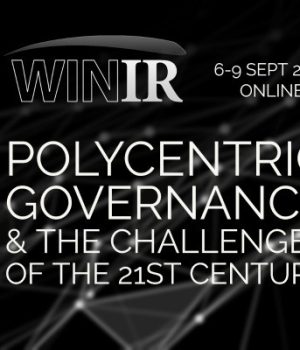This Webinar Series on Polycentric Governance aims to introduce and discuss key concepts in the field of Polycentric Governance (PG), as well as to address current applications and future research directions.
In this series, we aim to facilitate the dialogue between early career researchers, senior researchers, and practitioners who are interested in learning, better understanding, and debating foundational and new ideas in PG. The webinar is organized by Prof. Andreas Thiel’s research group at the University of Kassel, in concert with the Polycentricity Network website.
As a starting point for discussions, core ideas about polycentric governance will be presented based on the book “Governing Complexity: Analysing and Applying Polycentricity” (Eds.: Thiel, Andreas; Blomquist William A.; E. Garrick Dustin, 2019).
All sessions recordings may be found here (available for logged-in members only):
https://polycentricity.iasc-commons.org/index.php/webinar/pgwebinarrecording/
Next Session:
T.b.a.Past Sessions
“Understanding and Theorizing Polycentric Governance”
Presenting: William Blomquist & Andreas Thiel
21 January 2021 at 5:00 – 6:00 pm CET (UTC+1:00)
This first webinar covered foundational concepts for understanding and theorizing polycentric governance. In the first presentation of the webinar, William Blomquist explained how polycentric governance situations can be recognized, comprehended, and analyzed. This explanation includes identifying some key characteristics and observable features of polycentric governance.
Once they discussed defining features and relevant issues to address in research on Polycentric Governance, Andreas Thiel addressed what he sees as core categories of factors that shape a particular constellation of polycentric governance, its performance, and change. Specifically, a framework to interrelate research relevant to Polycentric Governance was introduced to identify research gaps and craft future research. The deep roots in the Bloomington School of Political Economy but also the challenges to take its ideas to larger systems of collective action were become apparent.
 William Blomquist is Professor of Political Science and Adjunct Professor of Public and Environmental Affairs at Indiana University Purdue University Indianapolis (IUPUI), and a Senior Research Fellow of the IU Ostrom Workshop. His research interests concern governmental organization and public policy, with a specialization in the field of water institutions and water management. His publications include The Realities of Adaptive Groundwater Management (forthcoming 2021) and Dividing the Waters: Governing Groundwater in Southern California (1992). He is the co-editor, with Andreas Thiel and Dustin Garrick of Governing Complexity: Analyzing and Applying Polycentricity (2019), and Co-Chair of the Ostrom Workshop’s Polycentricity Working Group.
William Blomquist is Professor of Political Science and Adjunct Professor of Public and Environmental Affairs at Indiana University Purdue University Indianapolis (IUPUI), and a Senior Research Fellow of the IU Ostrom Workshop. His research interests concern governmental organization and public policy, with a specialization in the field of water institutions and water management. His publications include The Realities of Adaptive Groundwater Management (forthcoming 2021) and Dividing the Waters: Governing Groundwater in Southern California (1992). He is the co-editor, with Andreas Thiel and Dustin Garrick of Governing Complexity: Analyzing and Applying Polycentricity (2019), and Co-Chair of the Ostrom Workshop’s Polycentricity Working Group.
 Andreas Thiel is Chair of International Agricultural Policy and Environmental Governance at the Faculty of Organic Agricultural Sciences, University of Kassel, Germany. He is affiliated faculty of the Vincent and Elinor Ostrom Workshop in Political Theory and Policy Analysis and recently, he was Senior Research Fellow of the Käte Hamburger Kolleg for Global Cooperation Research at University of Duisburg-Essen, Germany. His research addresses the analysis of the role of institutions in social ecological systems with particular emphasis on developing the lens of polycentric governance. Substantively, he works on water and agri-environmental governance and related public policy analysis in the EU, Northern and East Africa. Together with Bill Blomquist and Dustin Garrick he is co-editor of Governing Complexity: Analyzing and Applying Polycentricity (2019).
Andreas Thiel is Chair of International Agricultural Policy and Environmental Governance at the Faculty of Organic Agricultural Sciences, University of Kassel, Germany. He is affiliated faculty of the Vincent and Elinor Ostrom Workshop in Political Theory and Policy Analysis and recently, he was Senior Research Fellow of the Käte Hamburger Kolleg for Global Cooperation Research at University of Duisburg-Essen, Germany. His research addresses the analysis of the role of institutions in social ecological systems with particular emphasis on developing the lens of polycentric governance. Substantively, he works on water and agri-environmental governance and related public policy analysis in the EU, Northern and East Africa. Together with Bill Blomquist and Dustin Garrick he is co-editor of Governing Complexity: Analyzing and Applying Polycentricity (2019).
Measuring Performance in Polycentric Interactions: Concepts and Cases
Presenting: Tom Koontz & Sergio Villamayor-Tomas
04 February 2021 at 5:00 – 6:00 pm CET (UTC+1:00)
In this presentation, Tom Koontz and Sergio Villamayor-Tomas focus on interactions within polycentric governance systems. They describe three types of interactions: cooperation, conflict and conflict resolution, and competition. They draw on case studies to analyze which factors most affect each of these interaction types and the links between each of these interaction types and several performance measures.Results suggest different interaction types are better suited to different performance measures. Moreover, important trade-offs exist among specific performance criteria in polycentric governance.
 Tom Koontz is Professor of Environmental Policy at the University of Washington, Tacoma (USA). He is affiliated faculty of the Vincent and Elinor Ostrom Workshop in Political Theory and Policy Analysis. His research on collaboration and environmental governance has included cases in Germany, India, Ohio (USA), and most recently the Puget Sound (USA).Currently he is investigating the use of information, especially scientific information, in collaborative watershed planning. He was section co-editor for Part 2 of Governing Complexity: Analyzing and Applying Polycentricity (2019).
Tom Koontz is Professor of Environmental Policy at the University of Washington, Tacoma (USA). He is affiliated faculty of the Vincent and Elinor Ostrom Workshop in Political Theory and Policy Analysis. His research on collaboration and environmental governance has included cases in Germany, India, Ohio (USA), and most recently the Puget Sound (USA).Currently he is investigating the use of information, especially scientific information, in collaborative watershed planning. He was section co-editor for Part 2 of Governing Complexity: Analyzing and Applying Polycentricity (2019).
 Sergio Villamayor-Tomas is currently Ramon y Cajal Research Fellow at the Institute of Environmental Science and Technology (ICTA-UAB), at the Autonomous University of Barcelona. He is also affiliated with the Ostrom´s Workshop (Indiana University) and the Berlin Workshop in Institutional Analysis of Socio-Ecological Systems (WINS). His research topics include adaptation to droughts and other disturbances in the irrigation sector, bottom-up management solutions to the water-energy-food nexus, transboundary river management, and the interaction of social movements and commons management. He has co-edited a special issue in Env. Sci. and Policy on Polycentricity and enviornmental policy (2019). He was also author of Part 2 of Governing Complexity: Analyzing and Applying Polycentricity (2019).
Sergio Villamayor-Tomas is currently Ramon y Cajal Research Fellow at the Institute of Environmental Science and Technology (ICTA-UAB), at the Autonomous University of Barcelona. He is also affiliated with the Ostrom´s Workshop (Indiana University) and the Berlin Workshop in Institutional Analysis of Socio-Ecological Systems (WINS). His research topics include adaptation to droughts and other disturbances in the irrigation sector, bottom-up management solutions to the water-energy-food nexus, transboundary river management, and the interaction of social movements and commons management. He has co-edited a special issue in Env. Sci. and Policy on Polycentricity and enviornmental policy (2019). He was also author of Part 2 of Governing Complexity: Analyzing and Applying Polycentricity (2019).
Practicing Polycentric Governance
Presenting: Bryan Bruns
18 February 2021 at 5:00 – 6:00 pm CET (UTC+1:00)
—> Presentation Slides (PDF) <---
How can communities, associations, governments, and other organizations work better together? Principles for practicing polycentric governance include organizing at multiple scales, embracing self-governance, customizing solutions, and learning together. Communities working together to govern surface and groundwater commons in Rajasthan, India offer an example of challenges and opportunities for developing polycentric governance, as do various strategies to improve basin governance. Putting polycentric governance into practice can start with assessing how stakeholders are already interconnected and appreciative exploration of how they might improve their interactions. Institutional artisans can apply principles and mechanisms to craft overarching rules and other specific arrangements for polycentric governance. Polycentric governance can be facilitated by convening discussions among stakeholders, sharing knowledge, and empowering self-organized mutual adjustment.
 Bryan Bruns is an independent researcher and consultant with a particular interest in water governance, cooperation, and transforming social situations. He holds a Ph.D. in Sociology of Development from Cornell University (1991). His consulting practice specializes in improving participation in irrigation and water governance. He has worked in Indonesia, Vietnam, China, India, Yemen, Egypt, Nigeria, and elsewhere for organizations including the World Bank, International Water Management Institute, International Food Policy Research Institute, the Food and Agriculture Organization of the United Nations, and several national and international non-government organizations. He co-edited books on Negotiating Water Rights and Water Rights Reform: Lessons for Institutional Design as well as articles and conference papers on topics including participatory irrigation management, water user associations, water rights, cooperation, and polycentric governance. He is a Fellow of the Society for Applied Anthropology and a member of the International Association for the Study of Commons. In 2009-2010 he was a Visiting Scholar at the Ostrom Workshop in Political Theory and Policy Analysis at Indiana University Bloomington. More info at https://bryanbruns.com
Bryan Bruns is an independent researcher and consultant with a particular interest in water governance, cooperation, and transforming social situations. He holds a Ph.D. in Sociology of Development from Cornell University (1991). His consulting practice specializes in improving participation in irrigation and water governance. He has worked in Indonesia, Vietnam, China, India, Yemen, Egypt, Nigeria, and elsewhere for organizations including the World Bank, International Water Management Institute, International Food Policy Research Institute, the Food and Agriculture Organization of the United Nations, and several national and international non-government organizations. He co-edited books on Negotiating Water Rights and Water Rights Reform: Lessons for Institutional Design as well as articles and conference papers on topics including participatory irrigation management, water user associations, water rights, cooperation, and polycentric governance. He is a Fellow of the Society for Applied Anthropology and a member of the International Association for the Study of Commons. In 2009-2010 he was a Visiting Scholar at the Ostrom Workshop in Political Theory and Policy Analysis at Indiana University Bloomington. More info at https://bryanbruns.com
Many of the ideas in this presentation are discussed in chapter 11 of Governing Complexity: Analyzing and Applying Polycentricity edited by Andreas Thiel, William A. Blomquist, and Dustin E. Garrick, Cambridge University Press. pp 237-255. DOI: https://doi.org/10.1017/9781108325721.012 An open-access version of the chapter is available at: http://hdl.handle.net/10535/10693
Recommended readings related to this presentation include the following two articles as well as other references cited in the chapter:
- Ostrom, Vincent. 1980. “Artisanship and Artifact.” Public Administration Review, 309–17. https://doi.org/10.2307/3110256
- Aligica, Paul D., and Vlad Tarko. 2012. “Polycentricity: From Polanyi to Ostrom, and Beyond.” https://asp.mercatus.org/system/files%20/Polycentricity.pdf
Future research direction of policentric governance
Panelists: Elizabeth Baldwin, Rebeccea Gruby, Dustin Garrick, Mark Lubell, Michael Mc. Ginnis and Harini Nagendra. Moderation: Josephine van Zeben
04 March 2021 at 5:00 – 6:00 pm CET (UTC+1:00)
An exploration of the concept of coevolutionary governance as a progressive reinterpretation of polycentrism
Presenting: Peter Jones (UCL)
8th of April, at5:00 pm CET (European time)
Recommended reading: Jones P.J.S. and Long S.D. (in press) Analysis and discussion of 28 recent marine protected area governance (MPAG) case studies: challenges of decentralisation in the shadow of hierarchy. Marine Policy 104362. Open Access doi: 10.1016/j.marpol.2020.104362 . Supplementary Material. One of 20 papers in a special section of 28 case studies on MPA Governance ( contents list ).

Abstract
This webinar will discuss a recent analysis of the governance of MPAs through 28 case studies in 15 countries. Limitations of the polycentric governance concept will be discussed, particularly its faith in linkages as a means of resolving conflicts and its assumption that the state should only take a passive role. The concept of coevolutionary governance will be described and justified, noting that this essentially builds on polycentrism’s systematic case study analysis approach, but evolves it to move beyond its limitations. Coevolutionary governance takes a synecology perspective to analyse how incentives coevolve through their functional integration, as well as how social and ecological systems can coevolve through the feedback mechanisms of human impacts and ecological services. Drawing on the wider concept of multi-level governance, coevolutionary governance is considered to provide for synergies between governance approaches, proposing that coordination can be achieved and conflicts addressed through reconfigured roles of the state providing steer through governance in ‘the shadow of hierarchy’. The MPAG empirical framework will be described and the findings of its application outlined. Drawing on these findings, some key trends within and amongst five categories of incentives will be explored. These illustrate that incentives synergistically interact in a way that is analogous to synecology, providing for them to be functionally integrated as a means of combining governance approaches. As such, it will be argued that these findings support the validity of the coevolutionary governance concept, as well as supporting the argument that “diversity is the key to resilience, both of species in ecosystems and incentives in governance systems”.
Biography
Dr. Peter Jones is a Reader in Environmental Governance at the Department of Geography, University College London (UCL). He is an internationally recognised expert on marine protected area governance issues, having focused on this area of research for 30 years. He recently undertook an applied study for United Nations Environment (UNE) on how to effectively and equitably govern marine protected areas (MPAs), leading to the book Governing Marine Protected Areas: resilience through diversity (Routledge) and the forthcoming UNE policy document Enabling effective and equitable marine protected areas: guidance on combining governance approaches. This ongoing programme of research (www.mpag.info) now includes 50 case studies of MPAs from around the world, applying a novel theoretical and empirical framework that he has developed. Peter originally graduated in Biological Sciences, specialising in marine ecology, but his postgraduate studies and research have since adopted an applied inter-disciplinary approach, blending ecological, legal and social science perspectives to help address real world challenges related to MPAs.
“The impact of organizational diversity on local climate adaptation implementation “
Presenting: Dr. Derek Kauneckis(Desert Research Institute)
05.08.2021 at 5:00 – 6:15 pm CET (UTC+1:00)
In this now 8th. webinar sesseion Dr. Derek Kauneckis will present his work on polycentric arrangements around climate adaptation collaborations among local governments in the United States. More preceiszely, Dr. Kaunekis´s presentation is about statistical analysis from his latest researchfoundational concepts for understanding and theorizing polycentric governance.
 Derek Kauneckis is an Associate Research Professor at the Desert Research Institute in the Division of Earth and Environmental Sciences.
Derek Kauneckis is an Associate Research Professor at the Desert Research Institute in the Division of Earth and Environmental Sciences.
Dr. Kauneckis’ research focuses on governance and institutional design as applied to environmental and science/technology policy.
His current work focuses on climate change adaptation and local governance, the resilience of socio-ecological systems, and policy innovation and the science-policy interface. Currently he is studying the emergence of climate adaptation networks among local governments, climate resilience of western river systems, and the management of waste commons.
“A Polycentric Approach to Pandemic Governance “
Presenting: Prof.assit. Veeshan Rayamajhee(NDSU)
02.09.2021 at 5:00 – 6:15 pm CET (UTC+1:00; your time here)
Veeshan Rayamajhee will talk about a polycentric approach to pandemic governance. Veeshan is an assistant professor of economics in the Department of Agribusiness and Applied Economics and a faculty fellow at the Center for the Study of Public Choice and Private Enterprise at North Dakota State University. He studies human responses to natural hazards and other covariate shocks. Veeshan uses a range of empirical tools to study issues related to climate change, disasters, and environmental externalities, among others.
 Veeshan’s research has appeared in peer-reviewed journals such as Journal of Institutional Economics, Economics of Disasters and Climate Change, Disasters, Natural Hazards, Climate and Development, Journal of International Development, Food Security, and Renewable Energy.
Originally from Nepal, Veeshan received a Bachelor’s degree in Interdisciplinary Studies (Mathematics and Business management) and an Associate’s degree in Philosophy, both from Bryn Athyn College, Pennsylvania. He received his Master’s and doctorate degrees in economics from the University of New Mexico.
Veeshan’s research has appeared in peer-reviewed journals such as Journal of Institutional Economics, Economics of Disasters and Climate Change, Disasters, Natural Hazards, Climate and Development, Journal of International Development, Food Security, and Renewable Energy.
Originally from Nepal, Veeshan received a Bachelor’s degree in Interdisciplinary Studies (Mathematics and Business management) and an Associate’s degree in Philosophy, both from Bryn Athyn College, Pennsylvania. He received his Master’s and doctorate degrees in economics from the University of New Mexico.
If there are any questions, please do not hesitate to contact us at polycentricity_network@uni-kassel.de.
You do not need to be a member to the network to sign up for the webinar, but a membership offers many benefits, especially if you are an early career scientist to connect to the growing network of scientists, exchange and learn about Polycentric governance!The Editorial Team
Renata, Arvind and Jens










